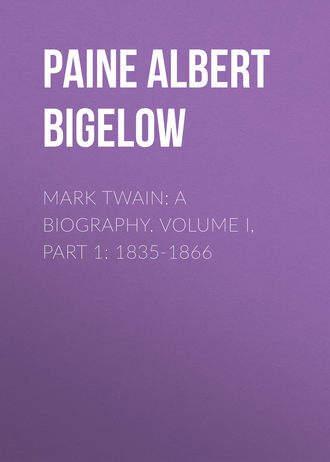 полная версия
полная версияMark Twain: A Biography. Volume I, Part 1: 1835-1866
Sometimes the boys needed money, which was not easy to get in those days. On one occasion of this sort, Tom Blankenship had the skin of a coon he had captured, which represented the only capital in the crowd. At Selms's store on Wild Cat corner the coonskin would bring ten cents, but that was not enough. They arranged a plan which would make it pay a good deal more than that. Selins's window was open, it being summer-time, and his pile of pelts was pretty handy. Huck—that is to say, Tom—went in the front door and sold the skin for ten cents to Selms, who tossed it back on the pile. Tom came back with the money and after a reasonable period went around to the open window, crawled in, got the coonskin, and sold it to Selms again. He did this several times that afternoon; then John Pierce, Selins's clerk, said:
"Look here, Selms, there is something wrong about this. That boy has been selling us coonskins all the afternoon."
Selms went to his pile of pelts. There were several sheepskins and some cowhides, but only one coonskin—the one he had that moment bought. Selms himself used to tell this story as a great joke.
Perhaps it is not adding to Mark Twain's reputation to say that the boy Sam Clemens—a pretty small boy, a good deal less than twelve at this time—was the leader of this unhallowed band; yet any other record would be less than historic. If the band had a leader, it was he. They were always ready to listen to him—they would even stop fishing to do that —and to follow his projects. They looked to him for ideas and organization, whether the undertaking was to be real or make-believe. When they played "Bandit" or "Pirate" or "Indian," Sam Clemens was always chief; when they became real raiders it is recorded that he was no less distinguished. Like Tom Sawyer, he loved the glare and trappings of leadership. When the Christian Sons of Temperance came along with a regalia, and a red sash that carried with it rank and the privilege of inventing pass-words, the gaud of these things got into his eyes, and he gave up smoking (which he did rather gingerly) and swearing (which he did only under heavy excitement), also liquor (though he had never tasted it yet), and marched with the newly washed and pure in heart for a full month—a month of splendid leadership and servitude. Then even the red sash could not hold him in bondage. He looked up Tom Blankenship and said:
"Say, Tom, I'm blamed tired of this! Let's go somewhere and smoke!" Which must have been a good deal of a sacrifice, for the uniform was a precious thing.
Limelight and the center of the stage was a passion of Sam Clemens's boyhood, a love of the spectacular that never wholly died. It seems almost a pity that in those far-off barefoot old days he could not have looked down the years to a time when, with the world at his feet, venerable Oxford should clothe him in a scarlet gown.
He could not by any chance have dreamed of that stately honor. His ambitions did not lie in the direction of mental achievement. It is true that now and then, on Friday at school, he read a composition, one of which—a personal burlesque on certain older boys—came near resulting in bodily damage. But any literary ambition he may have had in those days was a fleeting thing. His permanent dream was to be a pirate, or a pilot, or a bandit, or a trapper-scout; something gorgeous and active, where his word—his nod, even—constituted sufficient law. The river kept the pilot ambition always fresh, and the cave supplied a background for those other things.
The cave was an enduring and substantial joy. It was a real cave, not merely a hole, but a subterranean marvel of deep passages and vaulted chambers that led away into bluffs and far down into the earth's black silences, even below the river, some said. For Sam Clemens the cave had a fascination that never faded. Other localities and diversions might pall, but any mention of the cave found him always eager and ready for the three-mile walk or pull that brought them to its mystic door. With its long corridors, its royal chambers hung with stalactites, its remote hiding-places, its possibilities as the home of a gallant outlaw band, it contained everything that a romantic boy could love or long for. In Tom Sawyer Indian Joe dies in the cave. He did not die there in real life, but was lost there once, and was living on bats when they found him. He was a dissolute reprobate, and when, one night, he did die there came up a thunder-storm so terrific that Sam Clemens at home and in bed was certain that Satan had come in person for the half-breed's wicked soul. He covered his head and said his prayers industriously, in the fear that the evil one might conclude to save another trip by taking him along, too.
The treasure-digging adventure in the book had a foundation in fact. There was a tradition concerning some French trappers who long before had established a trading-post two miles above Hannibal, on what is called the "bay." It is said that, while one of these trappers was out hunting, Indians made a raid on the post and massacred the others. The hunter on returning found his comrades killed and scalped, but the Indians had failed to find the treasure which was buried in a chest. He left it there, swam across to Illinois, and made his way to St. Louis, where he told of the massacre and the burial of the chest of gold. Then he started to raise a party to go back for it, but was taken sick and died. Later some men came up from St. Louis looking for the chest. They did not find it, but they told the circumstances, and afterward a good many people tried to find the gold.
Tom Blankenship one morning came to Sam Clemens and John Briggs and said he was going to dig up the treasure. He said he had dreamed just where it was, and said if they would go with him and dig he would divide up. The boys had great faith in dreams, especially Tom's dreams. Tom's unlimited freedom gave him a large importance in their eyes. The dreams of a boy like that were pretty sure to mean something. They followed Tom to the place with some shovels and a pick, and he showed them where to dig. Then he sat down under the shade of a papaw-tree and gave orders.
They dug nearly all day. Now and then they stopped to rest, and maybe to wonder a little why Tom didn't dig some himself; but, of course, he had done the dreaming, which entitled him to an equal share.
They did not find it that day, and when they went back next morning they took two long iron rods; these they would push and drive into the ground until they struck something hard. Then they would dig down to see what it was, but it never turned out to be money. That night the boys declared they would not dig any more. But Tom had another dream. He dreamed the gold was exactly under the little papaw-tree. This sounded so circumstantial that they went back and dug another day. It was hot weather too, August, and that night they were nearly dead. Even Tom gave it up, then. He said there was something about the way they dug, but he never offered to do any digging himself.
This differs considerably from the digging incident in the book, but it gives us an idea of the respect the boys had for the ragamuffin original of Huckleberry Finn.—[Much of the detail in this chapter was furnished to the writer by John Briggs shortly before his death in 1907.]—Tom Blankenship's brother, Ben, was also drawn upon for that creation, at least so far as one important phase of Huck's character is concerned. He was considerably older, as well as more disreputable, than Tom. He was inclined to torment the boys by tying knots in their clothes when they went swimming, or by throwing mud at them when they wanted to come out, and they had no deep love for him. But somewhere in Ben Blankenship there was a fine generous strain of humanity that provided Mark Twain with that immortal episode in the story of Huck Finn—in sheltering the Nigger Jim.
This is the real story:
A slave ran off from Monroe County, Missouri, and got across the river into Illinois. Ben used to fish and hunt over there in the swamps, and one day found him. It was considered a most worthy act in those days to return a runaway slave; in fact, it was a crime not to do it. Besides, there was for this one a reward of fifty dollars, a fortune to ragged outcast Ben Blankenship. That money and the honor he could acquire must have been tempting to the waif, but it did not outweigh his human sympathy. Instead of giving him up and claiming the reward, Ben kept the runaway over there in the marshes all summer. The negro would fish and Ben would carry him scraps of other food. Then, by and by, it leaked out. Some wood-choppers went on a hunt for the fugitive, and chased him to what was called "Bird Slough." There trying to cross a drift he was drowned.
In the book, the author makes Huck's struggle a psychological one between conscience and the law, on one side, and sympathy on the other. With Ben Blankenship the struggle—if there was a struggle—was probably between sympathy and cupidity. He would care very little for conscience and still less for law. His sympathy with the runaway, however, would be large and elemental, and it must have been very large to offset the lure of that reward.
There was a gruesome sequel to this incident. Some days following the drowning of the runaway, Sam Clemens, John Briggs, and the Bowen boys went to the spot and were pushing the drift about, when suddenly the negro rose before them, straight and terrible, about half his length out of the water. He had gone down feet foremost, and the loosened drift had released him. The boys did not stop to investigate. They thought he was after them and flew in wild terror, never stopping until they reached human habitation.
How many gruesome experiences there appear to have been in those early days! In 'The Innocents Abroad' Mark Twain tells of the murdered man he saw one night in his father's office. The man's name was McFarlane. He had been stabbed that day in the old Hudson-McFarlane feud and carried in there to die. Sam Clemens and John Briggs had run away from school and had been sky larking all that day, and knew nothing of the affair. Sam decided that his father's office was safer for him than to face his mother, who was probably sitting up, waiting. He tells us how he lay on the lounge, and how a shape on the floor gradually resolved itself into the outlines of a man; how a square of moonlight from the window approached it and gradually revealed the dead face and the ghastly stabbed breast.
"I went out of there," he says. "I do not say that I went away in any sort of a hurry, but I simply went; that is sufficient. I went out of the window, and I carried the sash along with me. I did not need the sash, but it was handier to take it than to, leave it, and so I took it. I was not scared, but I was considerably agitated."
He was not yet twelve, for his father was no longer alive when the boy reached that age. Certainly these were disturbing, haunting things. Then there was the case of the drunken tramp in the calaboose to whom the boys kind-heartedly enough carried food and tobacco. Sam Clemens spent some of his precious money to buy the tramp a box of Lucifer matches—a brand new invention then, scarce and high. The tramp started a fire with the matches and burned down the calaboose, himself in it. For weeks the boy was tortured, awake and in his dreams, by the thought that if he had not carried the man the matches the tragedy could not have happened. Remorse was always Samuel Clemens's surest punishment. To his last days on earth he never outgrew its pangs.
What a number of things crowded themselves into a few brief years! It is not easy to curtail these boyhood adventures of Sam Clemens and his scapegrace friends, but one might go on indefinitely with their mad doings. They were an unpromising lot. Ministers and other sober-minded citizens freely prophesied sudden and violent ends for them, and considered them hardly worth praying for. They must have proven a disappointing lot to those prophets. The Bowen boys became fine river-pilots; Will Pitts was in due time a leading merchant and bank director; John Briggs grew into a well-to-do and highly respected farmer; even Huck Finn—that is to say, Tom Blankenship—is reputed to have ranked as an honored citizen and justice of the peace in a Western town. But in those days they were a riotous, fun-loving band with little respect for order and even less for ordinance.
XIII
THE GENTLER SIDE
His associations were not all of that lawless breed. At his school (he had sampled several places of learning, and was now at Mr. Cross's on the Square) were a number of less adventurous, even if not intrinsically better playmates. There was George Robards, the Latin scholar, and John, his brother, a handsome boy, who rode away at last with his father into the sunset, to California, his golden curls flying in the wind. And there was Jimmy McDaniel, a kind-hearted boy whose company was worth while, because his father was a confectioner, and he used to bring candy and cake to school. Also there was Buck Brown, a rival speller, and John Meredith, the doctor's son, and John Garth, who was one day to marry little Helen Kercheval, and in the end would be remembered and honored with a beautiful memorial building not far from the site of the old school.
Furthermore, there were a good many girls. Tom Sawyer had an impressionable heart, and Sam Clemens no less so. There was Bettie Ormsley, and Artemisia Briggs, and Jennie Brady; also Mary Miller, who was nearly twice his age and gave him his first broken heart.
"I believe I was as miserable as a grown man could be," he said once, remembering.
Tom Sawyer had heart sorrows too, and we may imagine that his emotions at such times were the emotions of Sam Clemens, say at the age of ten.
But, as Tom Sawyer had one faithful sweetheart, so did he. They were one and the same. Becky Thatcher in the book was Laura Hawkins in reality. The acquaintance of these two had begun when the Hawkins family moved into the Virginia house on the corner of Hill and Main streets.—[The Hawkins family in real life bore no resemblance to the family of that name in The Gilded Age. Judge Hawkins of The Gilded Age, as already noted, was John Clemens. Mark Twain used the name Hawkins, also the name of his boyhood sweetheart, Laura, merely for old times' sake, and because in portraying the childhood of Laura Hawkins he had a picture of the real Laura in his mind.]—The Clemens family was then in the new home across the way, and the children were soon acquainted. The boy could be tender and kind, and was always gentle in his treatment of the other sex. They visited back and forth, especially around the new house, where there were nice pieces of boards and bricks for play-houses. So they played "keeping house," and if they did not always agree well, since the beginning of the world sweethearts have not always agreed, even in Arcady. Once when they were building a house—and there may have been some difference of opinion as to its architecture—the boy happened to let a brick fall on the little girl's finger. If there had been any disagreement it vanished instantly with that misfortune. He tried to comfort her and soothe the pain; then he wept with her and suffered most of the two, no doubt. So, you see, he was just a little boy, after all, even though he was already chief of a red-handed band, the "Black Avengers of the Spanish Main."
He was always a tender-hearted lad. He would never abuse an animal, unless, as in the Pain-killer incident, his tendency to pranking ran away with him. He had indeed a genuine passion for cats; summers when he went to the farm he never failed to take his cat in a basket. When he ate, it sat in a chair beside him at the table. His sympathy included inanimate things as well. He loved flowers—not as the embryo botanist or gardener, but as a personal friend. He pitied the dead leaf and the murmuring dried weed of November because their brief lives were ended, and they would never know the summer again, or grow glad with another spring. His heart went out to them; to the river and the sky, the sunlit meadow and the drifted hill. That his observation of all nature was minute and accurate is shown everywhere in his writing; but it was never the observation of a young naturalist it was the subconscious observation of sympathetic love.
We are wandering away from his school-days. They were brief enough and came rapidly to an end. They will not hold us long. Undoubtedly Tom Sawyer's distaste for school and his excuses for staying at home—usually some pretended illness—have ample foundation in the boyhood of Sam Clemens. His mother punished him and pleaded with him, alternately. He detested school as he detested nothing else on earth, even going to church. "Church ain't worth shucks," said Tom Sawyer, but it was better than school.
As already noted, the school of Mr. Cross stood in or near what is now the Square in Hannibal. The Square was only a grove then, grown up with plum, hazel, and vine—a rare place for children. At recess and the noon hour the children climbed trees, gathered flowers, and swung in grape-vine swings. There was a spelling-bee every Friday afternoon, for Sam the only endurable event of the school exercises. He could hold the floor at spelling longer than Buck Brown. This was spectacular and showy; it invited compliments even from Mr. Cross, whose name must have been handed down by angels, it fitted him so well. One day Sam Clemens wrote on his slate:
Cross by name and cross by natureCross jumped over an Irish potato.He showed this to John Briggs, who considered it a stroke of genius. He urged the author to write it on the board at noon, but the poet's ambition did not go so far.
"Oh, pshaw!" said John. "I wouldn't be afraid to do it.
"I dare you to do it," said Sam.
John Briggs never took a dare, and at noon, when Mr. Cross was at home at dinner, he wrote flamingly the descriptive couplet. When the teacher returned and "books" were called he looked steadily at John Briggs. He had recognized the penmanship.
"Did you do that?" he asked, ominously.
It was a time for truth.
"Yes, sir," said John.
"Come here!" And John came, and paid for his exploitation of genius heavily. Sam Clemens expected that the next call would be for "author," but for some reason the investigation ended there. It was unusual for him to escape. His back generally kept fairly warm from one "frailing" to the next.
His rewards were not all of a punitive nature. There were two medals in the school, one for spelling, the other for amiability. They were awarded once a week, and the holders wore them about the neck conspicuously, and were envied accordingly. John Robards—he of the golden curls—wore almost continuously the medal for amiability, while Sam Clemens had a mortgage on the medal for spelling. Sometimes they traded, to see how it would seem, but the master discouraged this practice by taking the medals away from them for the remainder of the week. Once Sam Clemens lost the medal by leaving the first "r" out of February. He could have spelled it backward, if necessary; but Laura Hawkins was the only one on the floor against him, and he was a gallant boy.
The picture of that school as presented in the book written thirty years later is faithful, we may believe, and the central figure is a tender-hearted, romantic, devil-may-care lad, loathing application and longing only for freedom. It was a boon which would come to him sooner even than he had dreamed.
XIV
THE PASSING OF JOHN CLEMENS
Judge Clemens, who time and again had wrecked or crippled his fortune by devices more or less unusual, now adopted the one unfailing method of achieving disaster. He endorsed a large note, for a man of good repute, and the payment of it swept him clean: home, property, everything vanished again. The St. Louis cousin took over the home and agreed to let the family occupy it on payment of a small interest; but after an attempt at housekeeping with a few scanty furnishings and Pamela's piano —all that had been saved from the wreck—they moved across the street into a portion of the Virginia house, then occupied by a Dr. Grant. The Grants proposed that the Clemens family move over and board them, a welcome arrangement enough at this time.
Judge Clemens had still a hope left. The clerkship of the Surrogate Court was soon to be filled by election. It was an important remunerative office, and he was regarded as the favorite candidate for the position. His disaster had aroused general sympathy, and his nomination and election were considered sure. He took no chances; he made a canvass on horseback from house to house, often riding through rain and the chill of fall, acquiring a cough which was hard to overcome. He was elected by a heavy majority, and it was believed he could hold the office as long as he chose. There seemed no further need of worry. As soon as he was installed in office they would live in style becoming their social position. About the end of February he rode to Palmyra to be sworn in. Returning he was drenched by a storm of rain and sleet, arriving at last half frozen. His system was in no condition to resist such a shock. Pneumonia followed; physicians came with torments of plasters and allopathic dosings that brought no relief. Orion returned from St. Louis to assist in caring for him, and sat by his bed, encouraging him and reading to him, but it was evident that he grew daily weaker. Now and then he became cheerful and spoke of the Tennessee land as the seed of a vast fortune that must surely flower at last. He uttered no regrets, no complaints. Once only he said:
"I believe if I had stayed in Tennessee I might have been worth twenty thousand dollars to-day."
On the morning of the 24th of March, 1847, it was evident that he could not live many hours. He was very weak. When he spoke, now and then, it was of the land. He said it would soon make them all rich and happy.
"Cling to the land," he whispered. "Cling to the land, and wait. Let nothing beguile it away from you."
A little later he beckoned to Pamela, now a lovely girl of nineteen, and, putting his arm about her neck, kissed her for the first time in years.
"Let me die," he said.
He never spoke after that. A little more, and the sad, weary life that had lasted less than forty-nine years was ended: A dreamer and a moralist, an upright man honored by all, he had never been a financier. He ended life with less than he had begun.
XV
A YOUNG BEN FRANKLIN
For a third time death had entered the Clemens home: not only had it brought grief now, but it had banished the light of new fortune from the very threshold. The disaster seemed complete.
The children were dazed. Judge Clemens had been a distant, reserved man, but they had loved him, each in his own way, and they had honored his uprightness and nobility of purpose. Mrs. Clemens confided to a neighbor that, in spite of his manner, her husband had been always warm-hearted, with a deep affection for his family. They remembered that he had never returned from a journey without bringing each one some present, however trifling. Orion, looking out of his window next morning, saw old Abram Kurtz, and heard him laugh. He wondered how anybody could still laugh.
The boy Sam was fairly broken down. Remorse, which always dealt with him unsparingly, laid a heavy hand on him now. Wildness, disobedience, indifference to his father's wishes, all were remembered; a hundred things, in themselves trifling, became ghastly and heart-wringing in the knowledge that they could never be undone. Seeing his grief, his mother took him by the hand and led him into the room where his father lay.
"It is all right, Sammy," she said. "What's done is done, and it does not matter to him any more; but here by the side of him now I want you to promise me–"
He turned, his eyes streaming with tears, and flung himself into her arms.
"I will promise anything," he sobbed, "if you won't make me go to school!
Anything!"
His mother held him for a moment, thinking, then she said:
"No, Sammy; you need not go to school any more. Only promise me to be a better boy. Promise not to break my heart."
So he promised her to be a faithful and industrious man, and upright, like his father. His mother was satisfied with that. The sense of honor and justice was already strong within him. To him a promise was a serious matter at any time; made under conditions like these it would be held sacred.









